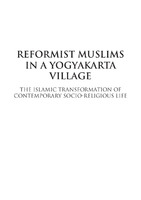Reformist Muslims in a Yogyakarta Village
The Islamic Transformation of Contemporary Socio-Religious Life
Abstract
This study examines the religious life of reformist Muslims in a Yogyakarta village. The foci of this discussion are on Muslim villagers’ construction, with the help of the reformist paradigm, of the image of the ‘good Muslim’ and ‘Muslim-ness’, on their efforts to incorporate an (reformist) Islamic framework to question taken-for-granted practices and ideas, on the position of traditional practices and ideas and their relation to reformist Islam, and on the interplay of villagers who show a strong commitment to reformist Islam with those who do not. Another topic investigated in this study is the interactions between Muslim and Christian villagers and the impacts of Christian presence on the process by which Muslims define themselves, their neighbours, their religion and their religious community.
Keywords
islam; religious life; culture; indonesia; muslims; religion; java; Allah; Christianity; Reformism; Rice; Supernatural; YogyakartaDOI
10.26530/OAPEN_459491Publisher
ANU PressPublisher website
https://press.anu.edu.au/Publication date and place
Canberra, 2007Classification
Social groups: religious groups and communities


 Download
Download Web Shop
Web Shop